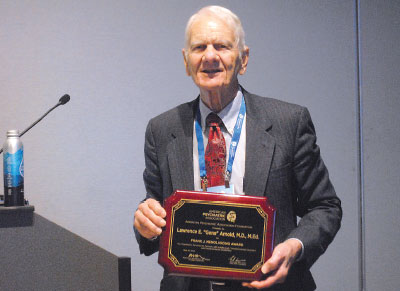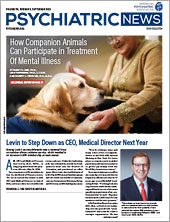Could taking time to set expectations of what a medication is supposed to do help young patients with autism respond to treatment? It’s certainly possible, according to L. Eugene Arnold, M.D., this year’s Frank J. Menolascino Award recipient. Arnold, who is a professor emeritus of psychiatry at Ohio State University, spoke during the Menolascino Award lecture at this year’s Annual Meeting.
During the lecture, he noted that one reason why so few clinical trials for autism have succeeded is due to a high placebo response. This response may be due in part to parental hope/expectations, but Arnold said there is a correlation between the child’s comprehension of treatment purpose and degree of placebo response.
“In a clinical trial you want to say as little as possible, but in general treatment, it might help to give the patient a clear understanding of what the medicine is supposed to be doing,” he said.
Established in 1997, the Frank J. Menolascino Award recognizes an individual who has made significant contributions to psychiatric services for persons with intellectual development disorders/development disabilities. This year’s award recognized Arnold, formerly director of the Division of Child and Adolescent Psychiatry at Ohio State, for his longstanding work assessing both traditional and complementary/alternative treatments for autism spectrum disorder.
Arnold said he believes that greater emphasis should be placed on evaluating complementary/alternative treatments for autism. Other than a few antipsychotics that reduce symptoms of irritability, there is a dearth of solid evidence for conventional medications in the management of autism symptoms.
One potential approach may be to focus on the gastrointestinal (GI) problems that present in patients with autism. Such problems are common in children with autism, though many people consider them an adverse side effect of the disorder. Besides being very picky eaters, many children with autism exhibit sensory behaviors like pica (eating non-food items) or licking objects for tactile stimulation. Combined with the fact that many children with autism are put on strong medications such as antipsychotics, one can see how poor GI health can develop. Arnold, though, explained that he believes GI problems are an inherent aspect of the disorder.
It was this belief that led Arnold to conduct a
pilot study involving cholesterol supplementation in 15 children with autism. The rationale was a rare disorder known as Smith-Lemli Opitz syndrome, in which people lack a key enzyme that makes cholesterol. As many as 80% of people with this syndrome have comorbid autism, suggesting there may be a broader connection between cholesterol and autism. The study found that children who received cholesterol supplements (450 mg/day, or about two eggs) showed improvements in anxiety and irritability relative to placebo.
“Cholesterol gets a bad rap, but the problem with elevated cholesterol is you have too much of a good thing; cholesterol deficiency is just as bad,” he said.
Arnold also described a handful of studies that suggested omega-3 fish oil supplements may also improve irritability, hyperactivity, and even social communication in children with autism. He noted the improvements were on average very modest, but since there is little downside except for possibly some diarrhea, it might be worth a try.
“[Arnold] is a national treasure to the field of psychiatry,” said John Campo, M.D., the Leonard and Helen R. Stulman Professor and Director of Child and Adolescent Psychiatry at Johns Hopkins Medicine, who introduced Arnold at the session. “He doesn’t just think outside the box. He asks, 'What box?’” ■

